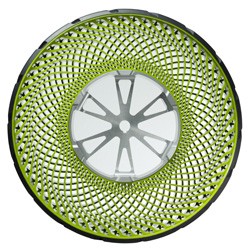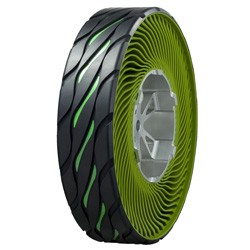The announcement that Bridgestone was developing an “airless” or non-pneumatic tire for the passenger vehicle market sparked the interest of many drivers. Although this prototype is still being developed, the future looks bright for this revolutionary tire.


Bridgestone airless tire technology features a unique spoke structure designed to support the weight of a vehicle, effectively eliminating the need to periodically refill the tires with air.
In 2013, Bridgestone revealed its second generation air free concept non-pneumatic tire featuring improved load-bearing capabilities, environmental design and driving performance. However, there are developments and enhancements to be made before airless tires are available for consumers.
Finding a way to avoid trapping debris within the spokes, as well as developing the best way to distribute weight evenly and consistently transmit loads are a couple of these hurdles. For reasons like these, many spectators think airless tires are still a decade or so away.
Despite this, the demand to keep up with the continuous advancements in the auto industry suggest that airless tires would be a welcome step forward for consumers as well as the auto industry.
Currently, most airless tires on the market are made from solid rubber or plastic. Golf carts, trailers and lawnmowers are a few examples of these tires being used in commercial applications.
Benefits of Airless Tires for Cars
No flat tires – ever
With airless tires, you never have to worry about your tires leaking because--you knew this was coming--non-pneumatic tires have no air to leak. For most drivers, this feature will sound nothing short of revolutionary.
When you run over a sharp object in the road, you won’t have to worry about a flat tire because tires without air can’t go flat. An end to the days of changing a tire on the highway shoulder would be welcome to drivers everywhere.
You won’t need a spare tire
Since you won’t be changing or repairing a flat, you don’t need to carry a spare. Just like cars using run-flat tires, this feature could free up trunk space. No spare also means less weight and less weight means better fuel economy
Vehicle-heavy industries can save money
Airless tires also may offer other specific advantages for trucks in industrial application. In the farming, mining, and construction industries, tire failure can cause a loss of productivity and efficiency. Tires that never leak or puncture would be a welcome advancement.
No part of a non-pneumatic tire ever needs to go in the garbage, which goes hand-in-hand with Bridgestone’s effort to create a “cradle-to-cradle” system in which all tires are first recycled and then factory-refashioned into new tires. Airless tires will be among the first for which this process is a reality.
Reduced CO2 emissions
About 90% of energy loss from tire rolling resistance comes from repeated changes in the shape of the tries as they roll. By simplifying the structure of the tire, Bridgestone was able to minimize the energy loss in these “air free concept tires.”
As a result, these tires have the same level of low rolling resistance as Bridgestone pneumatic fuel efficient Ecopia tires, contributing to reductions in CO2 emissions.
Eco-conscious
The airless concept tire is one of the initiatives aimed toward Bridgestone’s long-term vision of the use of sustainable materials. The materials used in the tire are recyclable, contributing to the efficient use of resources.
No part of a non-pneumatic tire ever needs to go in the garbage, which goes hand-in-hand with Bridgestone’s effort to create a “cradle-to-cradle” system in which all tires are first recycled and then factory-refashioned into new tires. Airless tires will be among the first for which this process is a reality.
The Future
Bridgestone is advancing development of the air-free concept tire are a more environmentally friendly product than existing tires and aims to bring about commercial use in a wide range of vehicles as soon as possible.
Bridgestone believes that through effective resource usage and efficient operations alongside CO2 emissions from improved fuel efficiency, as part of its aim to achieve a balance between its business and the environment, it can continue to offer attractive products to its consumers far into the future. Bridgestone will continue to implement multiple technological innovations to help bring about a more sustainable society.